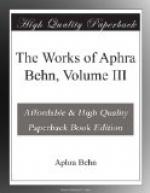p. 248 the George in White-Fryers. The George tavern was situated in Dogwell Court, and some little time after the abolition of the vicious privileges of Alsatia by the Act 8 and 9 William III, c. 27 (1697), it was converted into the printing office of William Bowyer, the elder. These premises were destroyed by fire, 30 January, 1713. Scene II, Act i of Shadwell’s The Squire of Alsatia (1688), is laid ’at the George in Whitefriars’.
p. 249 he cullies. To cully = to cheat; trick. Although the verb, which came into use circa 1670, and persisted for a full century, is rare, the substantive ‘a cully’ (= a fool) is very common. For the verb, cf. Pomfret, Poems (1699), Divine Attributes: ’Tricks to cully fools.’
p. 249 he pads. The substantive ‘pad’ = a path or highway. Bailey (1730-6) has ‘to Pad ... to rob on the road on foot.’ cf. Ford’s The Lady’s Trial (1639), v, I: ’One can ... pick a pocket, Pad for a cloak or hat’; and also Cotton Mather’s Discourse on Witchcraft (1689), chap, vii: ’As if you or I should say: We never met with any robbers on the road, therefore there never was any Padding there.’
p. 250 sport a Dye. To play at dice. ‘To sport’, generic for ’to parade’ or ‘display’ was, and is a very common phrase. It is especially found in public school and university slang. This is a very early example.
p. 250 Teaster. i.e. a tester—sixpence, cf. Farquhar’s Love and a Bottle, (1698), i, I, where Brush says: ’Who throws away a Tester and a mistress loses sixpence.’
p. 251 to top upon him. To cheat him; to trick him; especially to cheat with dice. cf. Dictionary of the Canting Crew (by B.E. gent., 1696): ’Top. What do you Top upon me? c. do you stick a little Wax to the Dice to keep them together, to get the Chance, you wou’d have? He thought to have Topt upon me. c. he design’d to have Put upon me, Sharpt me, Bullied me, or Affronted me.’
p. 251 we are not half in kelter. Kelter (or kilter) = order; condition; spirits. cf. Barrow, Sermons, I, Ser. 6: ’If the organs of prayer are out of Kelter, or out of time, how can we pray?’ Dictionary Canting Crew (1690), has: ‘Out of Kelter, out of sorts.’ The phrase is by no means rare.
p. 251 as Trincolo says. Lady Fulbank mistakes. The remark is made by Stephano, not Trincalo. Dryden and Davenant’s The Tempest (1667), Act ii, I: ’Ventoso. My wife’s a good old jade ... ... Stephano. Would you were both hanged, for putting me in thought of mine!’
p. 252 Ladies of Quality in the Middle Gallery. The jest lies in the fact that the middle gallery or eighteenpenny place in a Restoration theatre was greatly frequented by, if not almost entirely set aside for, women of the town. cf. Dryden’s Epilogue on the Union (1682):—




